11+ Legal Guardianship Letter Examples to Download
Sometimes it is a challenge to attend to your child every single moment. You have a very busy schedule at work or you are incapable of doing so due to unfortunate circumstances. But this doesn’t mean your child has to fend for themselves. If you know someone who is able to look after them in your place then with a legal guardianship letter you can give them the rights to take care of them.
What is Legal Guardianship Letter?
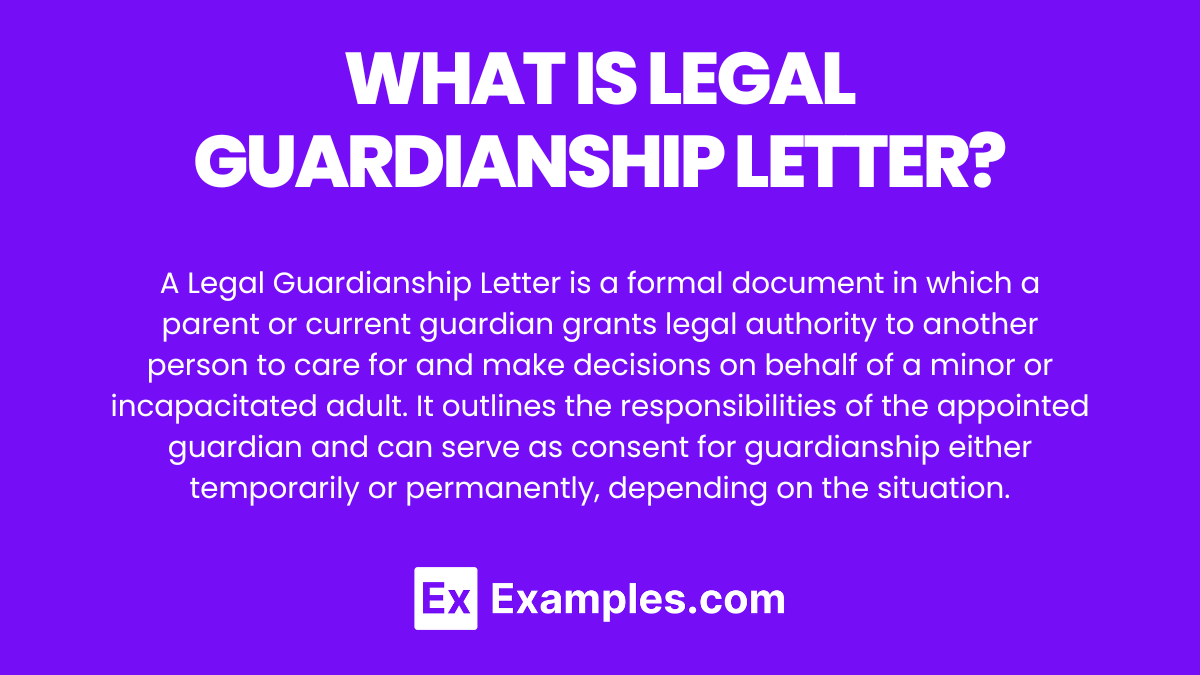
Legal Guardianship Letter Bundle
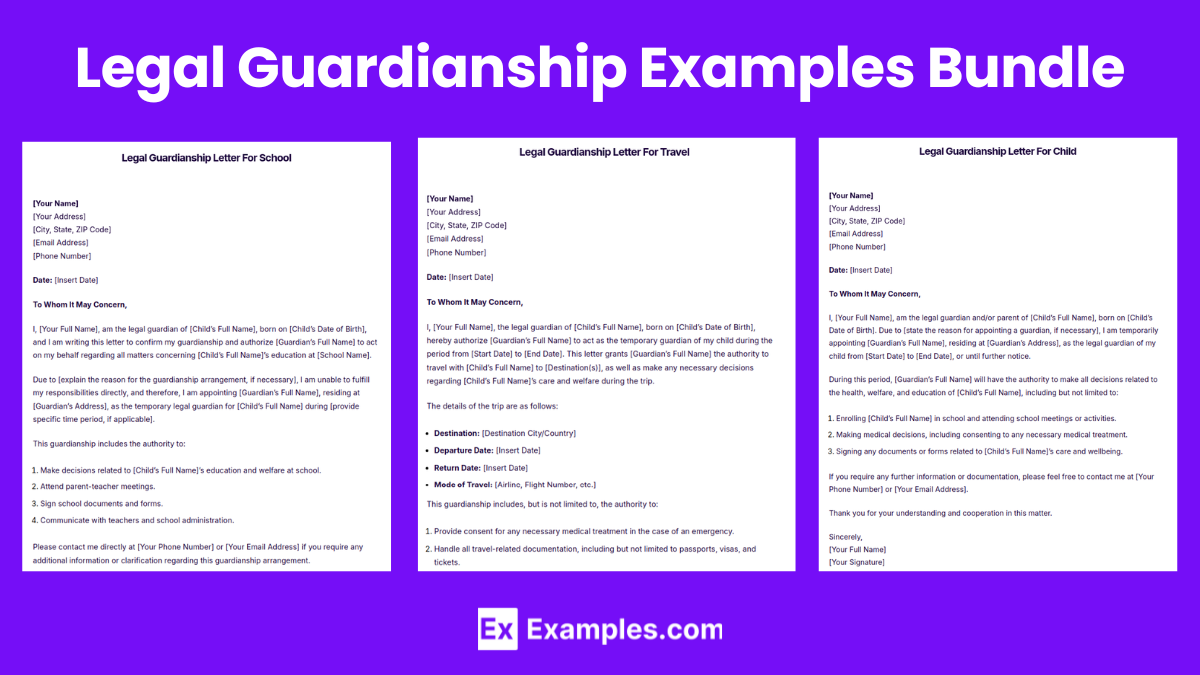
Download Legal Guardianship Bundle
Legal Guardianship Letter Format
Opening Remarks
Greeting:
Begin with a warm and respectful greeting.
Example: “Dear Sir/Madam,” or “To Whom It May Concern,”
Introduction
Purpose:
State the reason for writing the letter.
Example: “I am writing to formally request legal guardianship of [Name of Child].”
Acknowledgments
Biological Parents or Current Guardians
Recognition:
Acknowledge the role of the biological parents or current guardians in the child’s life.
Example: “I would like to recognize and thank [Names] for their care and dedication to [Name of Child] up to this point.”Legal Representatives
Appreciation:
Express appreciation for the legal representatives who have assisted with the guardianship process.
Example: “I am grateful to [Name of Attorney or Legal Firm] for their guidance and support throughout this process.”The Court
Gratitude:
Show respect and appreciation to the court handling the case.
Example: “I extend my sincere gratitude to the court for considering this application and for the attention to detail given to this matter.”Social Workers and Support Staff
Appreciation:
Acknowledge the efforts of any social workers or case managers involved.
Example: “Special thanks go to [Name] for their continued dedication to ensuring the best interests of [Name of Child].”
Closing Remarks
Summarize:
Briefly recap the reason for the letter.
Example: “In conclusion, I kindly request that the court grants me legal guardianship of [Name of Child], and I commit to providing them with a nurturing and stable environment.”Final Thanks:
Offer a final word of thanks.
Example: “Thank you for your time and consideration of this important matter.”
Farewell
Goodbye:
End with a polite farewell.
Example: “Sincerely, [Your Name]” or “Thank you, [Your Name].”
Legal Guardianship Letter Example
Dear Sir/Madam,
I am writing to formally request legal guardianship of [Name of Child], born on [Date of Birth]. As a [relationship to the child], I believe I am capable of providing [Name of Child] with a stable, loving, and supportive environment.
I would like to acknowledge the role of [Names of biological parents or current guardians] in caring for [Name of Child] up to this point. Their dedication has ensured that [he/she] has had the best start in life.
Additionally, I am grateful to [Name of Attorney or Legal Firm] for their assistance in navigating this process. Their professionalism and attention to detail have been invaluable in ensuring that all legal requirements are met.
I also extend my sincere appreciation to the court for reviewing this request and considering the best interests of [Name of Child]. I trust that the court will make the decision that is in [his/her] best interests.
Lastly, I want to express my gratitude to any social workers or case managers involved in this process, including [Name], for their continued dedication to ensuring the well-being of [Name of Child].
In conclusion, I kindly request that the court grants me legal guardianship of [Name of Child], and I commit to providing a nurturing and stable home for [him/her]. Thank you for your time and consideration of this important matter.
Sincerely,
[Your Full Name]
[Your Contact Information]
Short Legal Guardianship Letter Example
Legal Guardianship Letter For School

Legal Guardianship Letter For Travel

Legal Guardianship Letter For Child

More Legal Guardianship Letter Examples and Samples
Legal Guardianship Letter Examples in PDF
1. Sample Legal Guardianship Letter
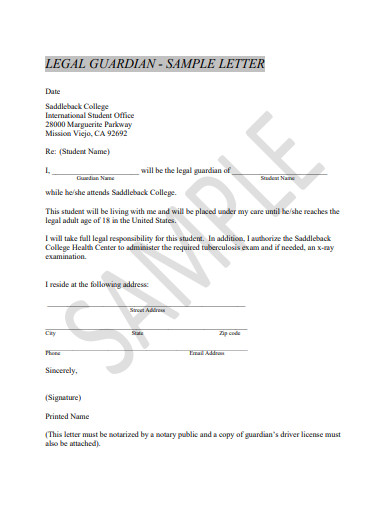
2. Legal Guardianship Letter Example
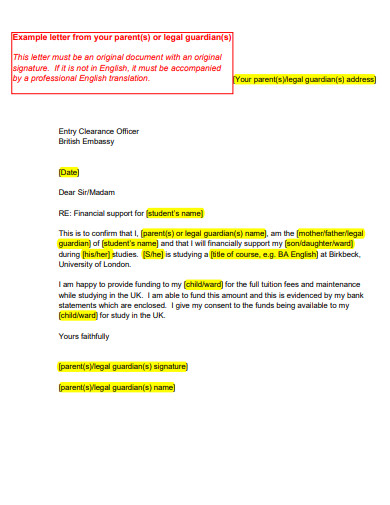
3. Sample Temporary Legal Guardianship Letter
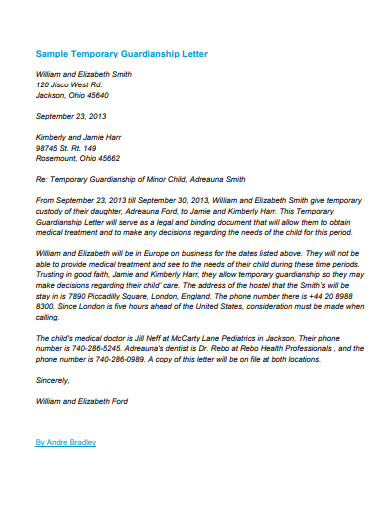
4. Printable Legal Guardianship Letter
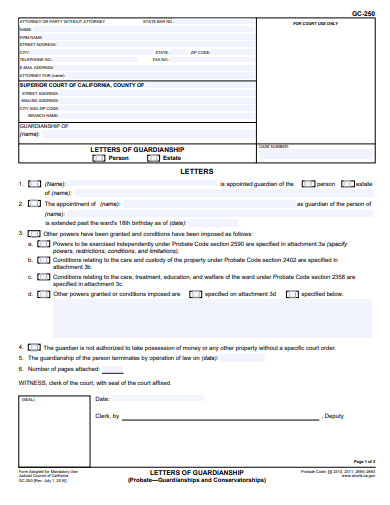
5. Legal Guardianship Appointment Letter
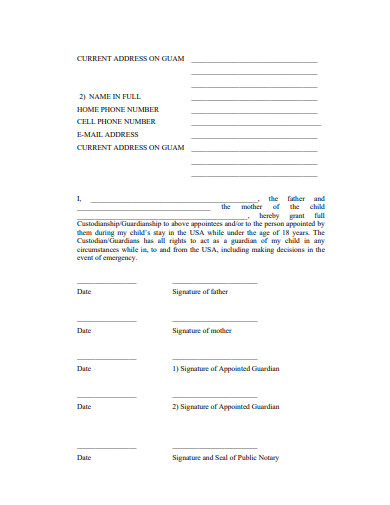
How to Write Legal Guardianship Letter?
A legal guardianship letter is a formal document used to grant temporary or permanent guardianship of a child or dependent to another person. This letter should clearly state your intention and provide all necessary information to ensure that the new guardian can legally care for the child. Below is a step-by-step guide to writing a legal guardianship letter:
Title and Date
Begin with a clear title, such as “Legal Guardianship Letter” or “Temporary Guardianship Authorization”.
Include the date at the top of the letter.Parent or Guardian’s Information
Include the full name, address, and contact details of the current legal guardian (you).
Specify your relationship to the child (e.g., parent, current legal guardian).Child’s Information
Provide the full name, date of birth, and address of the child or dependent.
If more than one child is involved, list each child separately.Guardian’s Information
Include the full name, address, and contact details of the person to whom you are granting guardianship.
Specify their relationship to the child.Duration of Guardianship
State the specific dates or time period for which the guardianship will be effective (e.g., from [start date] to [end date]).
If it’s a permanent guardianship, state this clearly.Reason for Guardianship
Briefly explain the reason for transferring guardianship (e.g., medical emergency, travel, etc.).
Details of Authority
Clearly outline the rights and responsibilities the guardian will have (e.g., medical decisions, school enrollment, etc.).
You may include any limitations on the guardian’s authority if applicable.Legal Guardian’s Consent
Provide a section where you state your consent as the current legal guardian, confirming that you willingly grant guardianship to the designated person.
Notarization and Signatures
Include your signature and the date.
Provide space for the new guardian’s signature, confirming their acceptance of the responsibility.
Consider having the letter notarized for added legal credibility. Many jurisdictions require notarization for legal guardianship documents.
Tips for Legal Guardianship Letter
Here are some tips for writing a legal guardianship letter:
- Clear Identification: Start by clearly stating the full names of the legal guardians and the person for whom guardianship is being assigned. Also, include the child’s full name (if applicable), birth date, and address.
- Purpose of the Letter: Clearly state the purpose of the letter, which is to grant legal guardianship. Make sure to specify the reason for assigning guardianship and the expected duration (temporary or permanent).
- Authorization: Explicitly authorize the guardian to make decisions regarding the child’s health, education, and general welfare. This section should be very clear to avoid any ambiguity.
- Details of the Guardians: Include the legal guardians’ relationship to the child, their contact information, and any relevant legal details, such as citizenship or residency status.
- Medical Consent: Specify that the guardians have the authority to make medical decisions in case of emergencies and to access the child’s medical records.
- Duration and Limitations: Mention the time period of the guardianship and any limitations or specific instructions regarding the child’s care, if applicable.
- Legal References: Reference any legal documents (such as court orders) that formalize the guardianship, and mention applicable state or country laws that regulate guardianship.
- Signature and Notarization: Sign the letter in front of a notary public to ensure its legal standing. Provide your contact details for further correspondence.
- Witnesses (if applicable): Some jurisdictions require signatures of witnesses. Be sure to include this if it’s required by your local laws.
- Attachments: Attach any relevant documents such as birth certificates, identification, and legal proof of guardianship if necessary.
FAQs
Who can write a legal guardianship letter?
A legal guardianship letter can only be written by the current legal guardian(s) or parent(s) of the minor or dependent individual. It must be signed and notarized to make it legally binding.
Does a legal guardianship letter need to be notarized?
Yes, most legal guardianship letters should be notarized to ensure their authenticity and legal standing. Notarization provides an extra layer of validation that the document is legitimate and that the signatures are genuine.
Is a legal guardianship letter permanent?
Not necessarily. Guardianship can be temporary or permanent, depending on the situation. The letter should clearly specify the time period for which the guardianship is granted.
Can a guardianship letter be used in case of an emergency?
Yes, if the letter explicitly grants medical decision-making authority, the appointed guardian can use the letter to make emergency medical decisions on behalf of the child or dependent.
Do I need a lawyer to create a legal guardianship letter?
While it’s not required to have a lawyer, it is advisable to consult one, especially in complex situations or when the guardianship is intended to be permanent. A lawyer can ensure that the letter complies with local laws.

